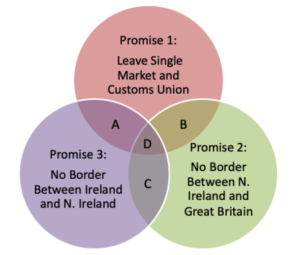The Internal Market Bill and Brexiters still unable to face the Brexit Trilemma

On 8 September Brandon Lewis uttered the now famous words: that the UK Government’s Internal Market Bill would “break international law in a very specific and limited way”. That set in train a series of events that even now, two months later, have framed the discussion about that Bill as one of Britain being unwilling to respect the Withdrawal Agreement and the Northern Ireland Protocol that Johnson had signed just 8 months earlier, and the wider consequences of being ready to break International Law.
European Commissioner Maroš Šefčovič put out a strongly worded statement 10 September: “The Vice-President stated, in no uncertain terms, that the timely and full implementation of the Withdrawal Agreement, including the Protocol on Ireland / Northern Ireland – which Prime Minister Boris Johnson and his government agreed to, and which the UK Houses of Parliament ratified, less than a year ago – is a legal obligation“, and the Commission followed this up 1 October with a letter of notification to the UK, and the UK has not responded in the month the Commission expected for a reply.
Meanwhile Biden’s victory in the US Presidential election has shone the light once more on what the President Elect said about Brexit in late September:
We can’t allow the Good Friday Agreement that brought peace to Northern Ireland to become a casualty of Brexit.
Any trade deal between the U.S. and U.K. must be contingent upon respect for the Agreement and preventing the return of a hard border. Period. https://t.co/Ecu9jPrcHL
— Joe Biden (@JoeBiden) September 16, 2020
Yet even now – and after the Internal Market Bill suffered a major defeat yesterday in the House of Lords (Lords voted 433 to 165 to remove all the offending clauses from the Bill) – the UK Government continues to dig in. Environment Minister George Eustice did the rounds of the TV studios promising that the Government would seek to reinstate the clauses in the back-and-forth between Lords and Commons, and Number 10 has re-emphasised that the clauses are “an important safety net”.
Irish Foreign Minister Coveney summed it up thus:
It’s for UK Parl to legislate as it sees fit.
But understand, if UK passes law designed to break International Law, WI & Protocol, then there will be no trade deal. EU cannot ratify a new deal while U.K. is legislating to break a previous agreement.
Trust & Good Faith Matters. https://t.co/OyS0Qw2csf— Simon Coveney (@simoncoveney) November 9, 2020
So what is going on here?
The EU, Ireland, the incoming administration and a huge majority in the House of Lords all see this the same way: no progress towards a Brexit Deal unless the clauses that contravene Withdrawal Agreement and the NI Protocol are removed. You can almost hear all of these people shouting “how can Number 10 be so stupid?”
I just wonder however if we are all, still, missing the point. That the political establishment – people like me and all those institutions – have been misinterpreting how Number 10 is playing this.
 Reading John Redwood’s ridiculous letter to Joe Biden made me realise our error. “It is the EU which seems to be planning new border controls on their side of the border which you may like to take up with them” Redwood wrote. How – even now – can he possibly be writing such drivel I said to myself, shaking my head.
Reading John Redwood’s ridiculous letter to Joe Biden made me realise our error. “It is the EU which seems to be planning new border controls on their side of the border which you may like to take up with them” Redwood wrote. How – even now – can he possibly be writing such drivel I said to myself, shaking my head.
The answer is because he still refuses to acknowledge the trilemma of trade offs most succinctly summed up J. Daniel Kelemen, and shown in the graphic here to the right. Johnson’s amended Withdrawal Agreement and NI Protocol is option A – some border or customs infrastructure between Northern Ireland and the rest of the UK, and the UK exiting the Single Market and the Customs Union. D is the have-it-all impossible unicorn, but that is what Redwood is still hoping for.
And this is actually not that far from what Johnson said back in September – that the Withdrawal Agreement “never made sense” with regard to Northern Ireland. Well in that sense he was correct – because even the DUP had cottoned onto that back in December 2019! And that leads you to something like C on Kelemen’s diagram… and back to the very deal May struck with the EU, and the Deal that Johnson lambasted as being too soft.
Putting all of this in other words: while the majority of the debate about the Internal Market Bill is about breaking international law or not, Johnson and the Brexiters are still a stage further back – even now refusing to come to terms with the reality that the Withdrawal Agreement and NI Protocol means the inevitable outcome that border infrastructure is needed between Northern Ireland and the rest of the UK (see headaches about truck parks for example). If there is to be a Brexit Deal between the UK and the EU, the Internal Market Bill boxes the UK into quadrant A in the diagram – and that explains why the provisions that contravene the Withdrawal Agreement and NI Protocol are so important to Brexiters. Those provisions offer a way to once again avoid confronting the trade offs. Their calculation is that trade off is sufficiently worth avoiding to mean it is preferable to annoy everyone from Michael Howard to Joe Biden.
You would not hear a Brexiter explain it as such, but essentially the response of Redwood, Johnson, Hannan and their ilk to the accusation that the Internal Market Bill is breaking international law is “So what? If we even entertain that debate, that means we have to acknowledge the trade offs implicit in Brexit. And we would sooner not acknowledge there are even any for a while longer yet.” And whoever it is trying to deliver that message that it is time for responsible decisions – be it the House of Lords or Biden or Coveney or von der Leyen – Brexiters sure do not want to hear it.
And all of that – with time running out towards the end of 2020 and the end of the transition period – only leads towards one outcome: No Deal.
[UPDATE 10.11.2020, 1630]
Phil Syrpis has come to a similar conclusion – and also uses Kelemen’s Brexit Trilemma – in this piece. Phil’s piece focuses more on the legal implications, mine more on the politics and communication, but the essential conclusion in both cases is very similar! And follow him on Twitter too – Phil is one of the most friendly and helpful academics about Brexit matters.
A question. The Tories insist that it won’t be them that put up a border between the south & north of Ireland. However in the event of no deal if they don’t put up a border then they will not be able to enforce tariffs, standards & quotas between the UK and Ireland. Won’t this mean that under WTO conditions that they won’t be allowed to charge tariffs to any country they trade with unless they have a trade deal with that country? If this is correct this would lead to an influx of cheap/low quality imports which would devastate UK manufacturing & farming. Have I understood this correctly?
Unfortunately, strictly in terms of logic, option D looks quite possible to me. It would be fulfilled by the Republic of Ireland leaving the EU, Single Market and Customs Union, and reverting to being an English colony, though with no representation this time in the UK Parliament.
And never mind that, in the certain absence of agreement to this, under any imaginable circumstances, by the Republic of Ireland (or apparently, indeed, any of its citizens), any attempt to enforce (or even demand) this would be another (dubiously) “limited and specific” breach of international law – that doesn’t seem to worry the current UK government.
” If there is to be a Brexit Deal between the UK and the EU, the Internal Market Bill boxes the UK into quadrant A in the diagram” – Did you mean to say there that the NI Protocol boxes the UK into quadrant A?
The offending clauses of the Internal Market Bill would effectively put the UK into quadrant B (i.e. because of the UK government’s refusal to implement the sea border, the default position will end up being a hardening of the land border in Ireland).
But if it’s no deal there are border controls Northern Ireland/ Ireland. Who puts a border up is irrelevant, the world knows who caused the issue .
Lately I’m recently reminded of the Fyre Festival and the lengths the organizers went to in the final weeks to perpetuate the illusion that the event was going to be a success even though failure was assured.